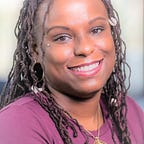Look Up! Stand Up! Learn!
I recently watched the movie Don’t Look Up. In it the two main characters are trying to warn humanity about a giant comet that will crash into earth in six months, killing all of humanity when it does. But the political powers want to control the narrative and try to profit off the comet and so they embark on a campaign to tell people not to look up at the sky. That is, not to look up and see this large comet hurtling towards earth for themselves. Now obviously, the plot is ridiculous, but the notion that society can be persuaded to ignore data and facts that they can clearly see with their own eyes isn’t. That scares me and it should scare you.
In honor of Black History Month and the 2023 theme Black Resistance, which uplifts the importance of social resistance as a means for African Americans to claim their rightful space in this country. A resistance in which “education, whether in elementary, secondary, or higher education institutions, have been seen as a way for Black people and communities to resist the narrative that Black people are intellectually inferior…[and] as a way to provide a space and resources to critically educate students about their history.” I got to thinking, when it comes to education and African Americans, what else can be seen when we look up? Here is a brief summary of what I saw.
Florida rejects a new Advanced Placement Course on African American Studies. The Florida department of education said that the course content was “inexplicably contrary to Florida law and significantly lacks educational value.” A revised version has been put forth by the College Board but does not include such topics as Black Lives Matter or Intersectionality except as a topic for optional student projects. College Board did acknowledge errors in the rollout of the pilot curriculum including making the following statement:
We deeply regret not immediately denouncing the Florida Department of Education’s slander, magnified by the DeSantis administration’s subsequent comments, that African American Studies “lacks educational value.” Our failure to raise our voice betrayed Black scholars everywhere and those who have long toiled to build this remarkable field.
Newsom vetoes a bill (AB 2774) that would have expanded the definition of “unduplicated pupil” in the Local Control Funding Formula (LCFF) by adding a pupil who is classified as a member of the lowest performing subgroup or subgroups, with the caveat that this group cannot already be identified in existing LCFF groups that qualify for supplemental funding (English learners, low-income pupils, foster youth, and students with disabilities). This bill would have provided much needed fiscal support for districts to address the needs of African American students who data shows are consistently the lowest performing student groups. The good news is, is that the equity multiplier looks to take its place.
Diversity, equity, and inclusion (DEI) backlashes are real. The much-needed focus on reducing inequities in education often comes with a huge rejection or undermining of the DEI efforts for change. Unfortunately, it seems that abandoning the effort is easier than staying the course. It seems people are more upset about being called out for racism and bias, than of committing acts of racism and bias. Some even feel that DEI approaches “often blame white people — or their culture — for harming people of color.” So much so that legislation is being suggested that would, among other things, prohibit spending to promote “support, or maintain any programs or campus activities that …espouse diversity, equity, and inclusion or Critical Race Theory rhetoric.”
Lastly, areas of study like gender studies, intersectionality, critical race theory, and classic books by respected authors like I Know why The Caged Bird Sings by Maya Angelou, The Color Purple by Alice Walker, and The 1619 Project by Nikole Hannah-Jones are being banned in education settings. Books like these offer perspectives that aren’t typically taught. They equip people with enough knowledge to decide for themselves what they believe to be true about the soul of our nation. For example, Hannah-Jones uses the term “forced labor camps” instead of plantations to describe the living conditions of slaves.
If you can control what people learn, then you can control what people believe.
What does it say about our country, that some do not want people to have access to these books that broaden people’s thinking about life and the history of our country? Limiting what knowledge someone has access to for fear of what they might do with it is reminiscent of thinking that made it illegal to teach a slave to read or write.
It’s sobering. I can’t unsee what I saw. There are a lot of things happening right now that are frightening. But if I don’t look, or rather WE don’t look, we can’t do anything about it. The late Congressman John Lewis reminds us to “not get lost in a sea of despair. Be hopeful, be optimistic. Our struggle is not the struggle of a day, a week, a month, or a year, it is the struggle of a lifetime. Never, ever be afraid to make some noise and get in good trouble, necessary trouble.”
So here is my challenge for you, today, this week, this month, and every month, LOOK UP and get in good and necessary trouble.
